What is Decentralised Storage on Blockchain?

As the world becomes increasingly digitised, reliable and secure data storage is more critical than ever. However, storing data in centralised cloud storage has some serious drawbacks. The data storage industry requires change. With the rise of blockchain technology, decentralised cloud storage has emerged as a promising solution for overcoming the disadvantages of a traditional one. In this article, we explore what a decentralised cloud storage network is, its strengths and limitations, and look at the most prominent projects in this field.
Most data out there is centralised, and by decentralising it, I wanted to provide a similar service that was faster, cheaper and more secure — without forcing the users to change their habits too much. — Shawn Wilkinson, Founder and Chief Strategy Officer of Storj.
Decentralised cloud storage technology
What is a decentralised storage system?
Decentralised cloud storage is an approach to storing data distributed using blockchain technology. Unlike traditional cloud storage, which relies on a centralised server or data centre, decentralised cloud storage distributes data across multiple nodes in a blockchain network, removing the need for a single point of control or failure. Nodes collectively store and protect data and provide access to the files to the owners. For their service, nodes in a decentralised storage network are remunerated with tokens paid by users.
How does decentralised data storage work?
The specific details of the operation vary from one decentralised storage project to another, but in general, the process of decentralised file storage involves the following steps:
- Data encryption. The data stored in the decentralised storage network is usually encrypted using cryptographic hash mechanisms. The private key gives the user access to the data and prevents unauthorised persons from decrypting the information.
- Data fragmentation. The data is broken down into smaller pieces, often called "chunks" or "shards".
- Data distribution. The encrypted data shards are then distributed across multiple nodes in the blockchain network. Each stores a copy of the encrypted data shard, creating redundancy and eliminating the problem of having a single point of failure.
- Consensus and verification. The blockchain network reaches a consensus on the integrity and authenticity of stored data through cryptographic techniques. This ensures that the data remains secure and tamper-proof.
- Retrieval and reassembly. When the data needs to be retrieved, the encrypted shards are fetched from nodes and reassembled to reconstruct the original data. Only the user who owns the private key can decrypt and access the data.
Centralised vs Decentralised storage systems
Centralised cloud storage, although widely used, has some serious problems that are forcing the search for alternative methods of storing:
- Single point of failure. Centralised cloud storage relies on a single server or data centre to store data, creating a single failure point. If the server or data centre experiences technical issues, downtime, or a security breach, it can result in data loss, service disruptions, or unauthorised access to data.
- Lack of control and ownership. With centralised cloud storage, users typically don't have full control and ownership over their data. The data is stored on third-party servers, and users may have limited control over how their data is used, accessed or shared.
- Privacy and data security risks. Centralised cloud storage involves entrusting data that may be sensitive to a third-party service provider. This raises the risk of harm to users in case of data breaches, unauthorised access or data sharing with other parties by malicious actors or the cloud storage provider itself.
- Risk of censorship. Centralised data storage can make it easier for the centralised authority, such as a government or service provider, to exert control over information and limit access to it.
- Cost. Centralised cloud storage providers typically charge fees based on data storage and bandwidth usage, which can add up over time, especially for large-scale storage needs.
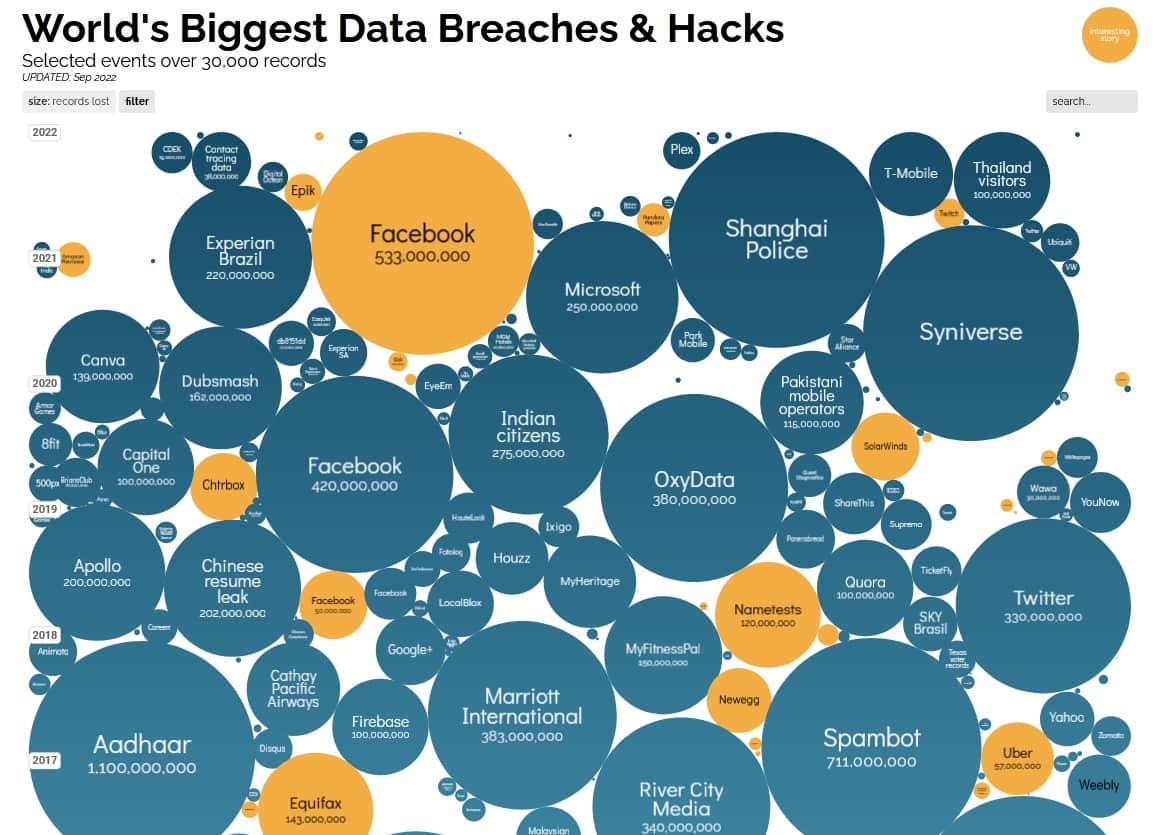
Benefits of decentralised storage
Decentralised file storage isn't something new. First-generation peer-to-peer decentralised storage networks, such as Napster or Torrent, were widely used for sharing music, video, text and other files. However, it was the emergence of blockchain technology that gave rise to a new generation of decentralised storage networks.
Decentralised cloud storage on blockchain offers several benefits over traditional options:
- Increased security. Decentralised data storage is inherently more secure than centralised one, as it uses advanced encryption and cryptographic techniques to secure data across multiple nodes on the network. This means that data stored on a decentralised network is much more difficult to hack, tamper with or compromise, making it an ideal solution for storing sensitive or confidential information.
- Improved data privacy. Decentralised data storage allows users to have greater control over their data, eliminating the need for a centralised authority to manage the data.
- Increased reliability. With data stored redundantly on multiple nodes in a network, decentralised storage networks have no single point of failure. This means that even if some nodes on the network fail, the data remains accessible and can be easily recovered.
- Lower costs. Decentralised data storage can be noticeably cheaper than traditional centralised storage options, eliminating the need for expensive data centres and infrastructure. Instead, users can contribute unused storage space and computational resources to the network, creating a more cost-effective solution.
Challenges and limitations of decentralised storage
Despite the benefits, several problems need to be addressed:
- Performance limitations. Decentralised storage networks can sometimes suffer from performance issues due to the need for data to be distributed across multiple nodes on the network. This can result in slower data retrieval times, especially for larger files.
- Storage capacity limitations. Decentralised storage networks are limited by the amount of storage capacity available on the network, making it difficult to store very large amounts of data.
- Complexity. Current decentralised storage solutions are more complex to set up and use than centralised options, which may discourage technically inexperienced users.
- Token price volatility. Decentralised storage networks typically store data in exchange for crypto tokens. Token price volatility can mean unpredictable storage costs, making budgeting for those costs difficult. Furthermore, most decentralised storage solutions don't offer the option to pay with third-party tokens, making the user fully dependent on the price of the specific token of that decentralised cloud storage.
Decentralised storage technology has huge potential. But to have good chances of success in the market, it needs to address the issues outlined above, providing a valid alternative to centralised solutions.
Decentralised storage networks
The decentralised storage sector is now seeing an influx of participants. Let's take a look at some of the more prominent decentralised storage projects.
IPFS + Filecoin
InterPlanetary File System (IPFS) is a decentralised protocol that enables users to store and share files on a peer-to-peer network. Rather than relying on traditional URLs to locate files, IPFS uses content-addressing to uniquely identify each file in a global namespace, connecting IPFS hosts. This unique identification system allows files to be retrieved from any IPFS node on the network, making it a robust and flexible solution for distributed file storage and sharing. Additionally, IPFS enables hypermedia applications, allowing for the creation of decentralised websites and applications.
Filecoin is a project built on IPFS. Filecoin is a cryptocurrency and decentralised storage marketplace that connects users with miners who have spare storage capacity.
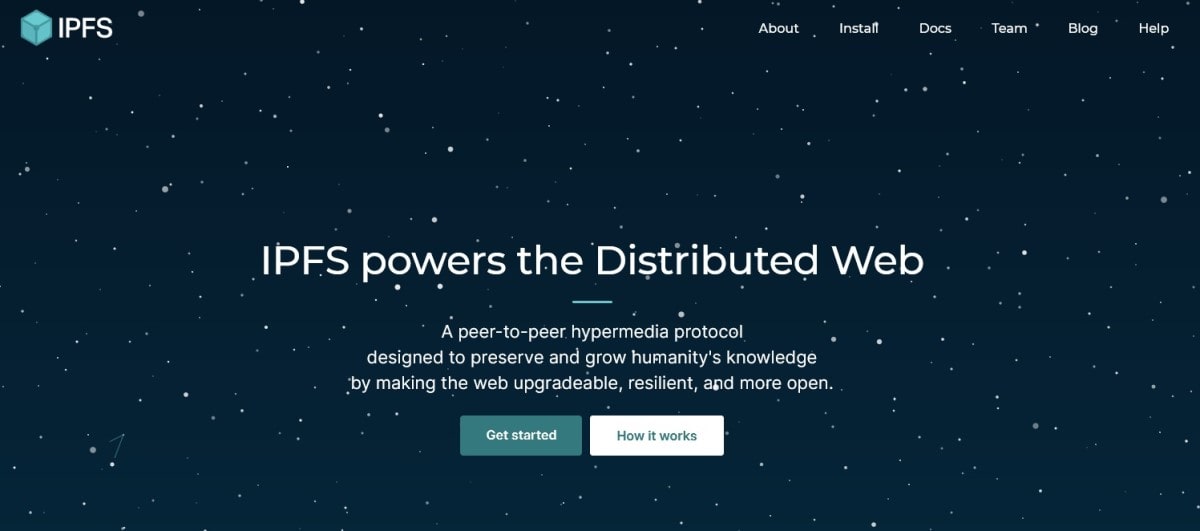
Sia
Sia is a blockchain-based cloud platform that aims to provide a decentralised storage solution. Peer-to-peer nodes on the Sia network can rent hard disk space from each other to store data instead of renting it from a centralised provider. If a user has unused hard disk space, they can lease it at Sia and earn money from it in the Siacoin cryptocurrency (SC). The storage service on the Sia network is processed by signing a smart contract. In doing so, the host confirms the provision of storage of a certain volume for an agreed period of time. Sia's approach to storage allows for high levels of redundancy and availability, low latency and fast data transfer speeds.
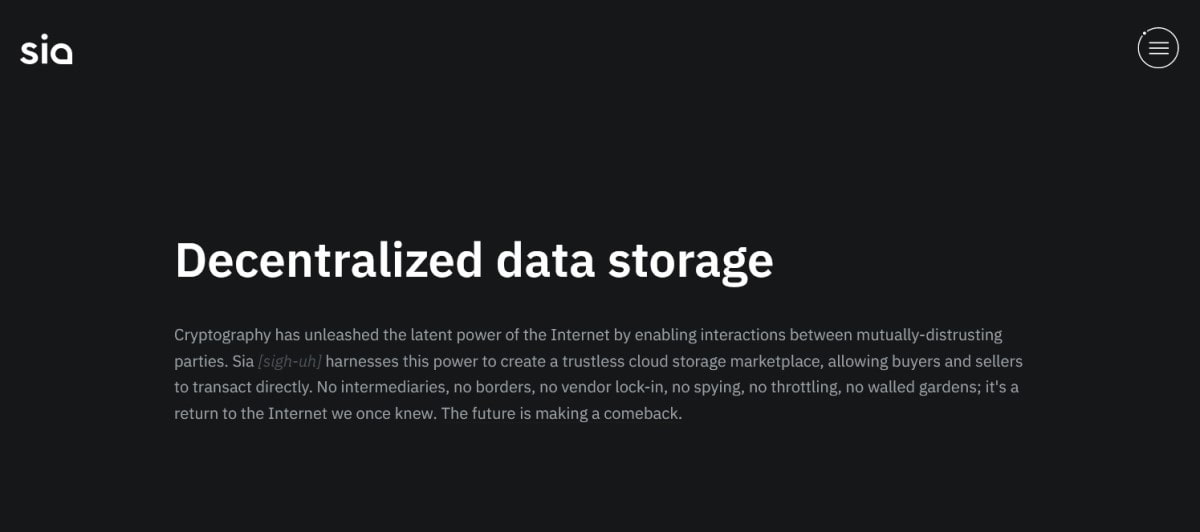
Storj
Storj is a decentralised open-source cloud storage system that enables users to securely store their files in an encrypted form. The platform is built on the Ethereum blockchain and uses Storage Node Operators to provide disk space for storing data. In exchange for their services, these operators are rewarded with Storj tokens. To ensure high levels of security and redundancy, each file stored on the Storj network is divided into 80 shards distributed across the network. However, only 29 shards are needed to restore the entire file. Storj performs regular checks to ensure that all nodes continue storing their respective shards. If a node fails the check, it won't receive a reward for storing the data.
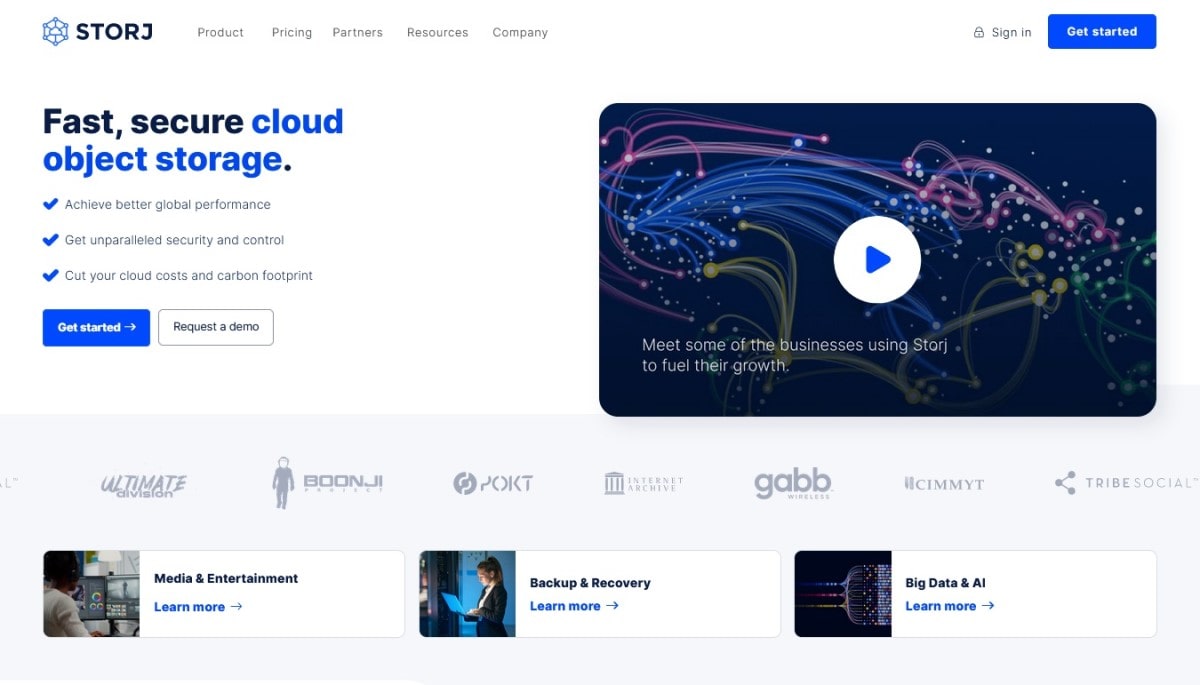
Arweave
Arweave is a decentralised storage project that uses the Proof-of-Access consensus algorithm. Arweave allows users to pay a one-off fee for storing data indefinitely. Unlike most blockchain projects, the Arweave network is built on Blockweave technology. In this system, new blocks are linked to 2 previous blocks. The Arweave protocol is compatible with HTTP. This allows it to work in traditional web browsers such as Chrome, Brave or Firefox.
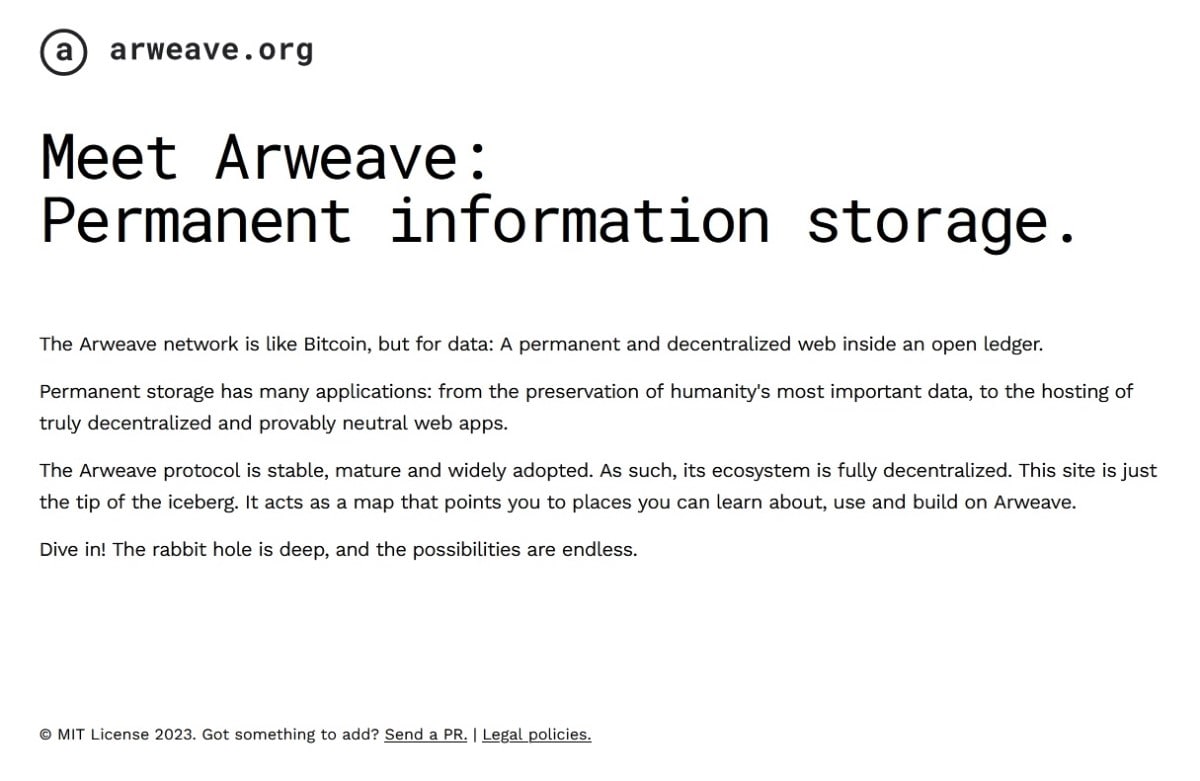
Tags
Try our Bitcoin Cloud Miner and get additional crypto rewards based on your trading volume. It's immediately available upon registration.
Try our Bitcoin Cloud Miner and get additional crypto rewards based on your trading volume. It's immediately available upon registration.



